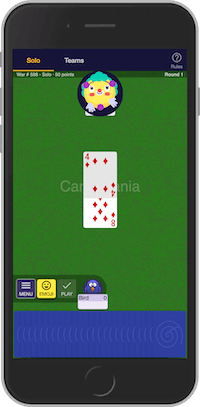Overview
War is a classic game where players draw cards from their decks and see who has the highest card. Traditionally, War is played with 2 players and, due to its simplicity, is usually a game parents and grandparents play with kids to introduce them to card games. At CardzMania, we have used that teaching angle and taken it one step further by adding more features to the traditional game so you can introduce kids to trick playing, team games and other card game basics. You can play War with 2 to 12 players.
Presets
- Solo War: Players play by themselves
- Teams War: Players play in teams of two and score combined points as teams
Ranking of Cards
Aces are high and 2s are low.
Play Multiplayer War Online
The Deck and the Deal
War is played with a standard deck of 52 cards. The dealer begins by passing out all 52 cards, one by one, face down, to each player. In the case of 2 players, 26 cards are dealt face down to each person. If more than 2 people are playing, all cards are distributed equally to all players and any left over cards form an out-of-play facedown stock.
How to Play
Players simultaneously draw the top card of their decks and flip it over to the middle of the gameplay area without looking at it. The player with the highest card wins a point. At CardzMania, this happens turn by turn and the winner of the previous pile leads the first card on the next pile.
If the same valued card is drawn, the player who drew the first card wins. Traditionally, this is handled differently when a 'War' happens and the same valued cards are left on the table while players draw another set of cards to determine who wins the entire pile. This continues to happen until a winner is declared. In some variations, players draw additional one, two, three or four cards and put them face down on the pile before putting a face up card for the next turn. Those additionally drawn cards are also won as part of the war and provide that extra importance to winning the war.
Traditionally, the game continues with the accumulated cards by each player until one player runs out of cards; at CardzMania, we don't reuse or reshuffle the existing cards, nor do we distribute the deck for the next round of play.
Scoring
Whenever a player wins a draw, they receive a point. For teams, the score is accumulated across all players of the team.
Winning
The game ends when a player reaches a predetermined amount of points. The player with the highest points wins the game.
Variations
CardzMania supports several customizable rules and options so you can play War exactly how you like or how you grew up playing with your friends and family. In addition to the classic way of playing, we often have new creative options for you to try to spice up the game if you are interested in trying different spins for fun.
Points
Players determine a set amount of points when the game ends.
Rounds
Players determine a set amount of rounds (also known as hands or deals) that the game will go to (instead of the points selection above).
Timer
Players only have a set amount of time to make their turn after which a turn is automatically played for them and the game proceeds: Fast is 7 seconds, Standard is 15 seconds, Slow is 30 seconds, and Very Slow is 60 seconds. Players can also choose to disable the timer, but that is only for private tables.
Blind
Players play without looking at their cards. This is how the game is played traditionally. At CardzMania, we allow you to disable this setting, allowing players to look at their cards and choose what they want to play on their turn. This way, players can make an educated decision to best utilize their hand and play with some strategy.
First Card Wins
If players draw the same valued card, the card that was played first wins the cards. When disabled, the card that was played second wins the cards.
Winner
Players can determine how tricks are won. Traditionally, the highest card drawn wins the trick. At CardzMania, we also allow you to use suit ranking as the criteria for selecting a winner. You can use this feature to introduce basic trick play to newer card players.
Trump
Players can determine whether they would like to play with a trump suit (only applicable with suits play). When enabled, a trump suit will be determined automatically for each round. Players can decide to cycle through the following suit order: Clubs, Diamonds, Hearts and Spades. Players can also choose to add a No Trumps option to the cycle; If selected, the order would be: Clubs, Diamonds, Hearts, Spades and No Trumps. Like the Blind variation, this feature also adds some strategy to the game.
Double Deck
If you have less than 7 players, then you can choose to play with two decks, or 104 cards. If you have more than 6 players, you will automatically play with two decks.
Trick Basics
Trick Taking games center around having the highest ranked card in a draw. Typically, players of trick taking games sit in a circle, sometimes in teams and sometimes playing solo, and are dealt a hand of cards. Given the specific game's card ranking (and trump - special suit that beats other suits), players draw a card from their hand in hopes that it outranks the other cards played. The player who outranks the others wins the trick for that round and gameplay is repeated until the cards are exhausted. Typically the player or team with the most tricks wins the game.
In a trick, each player plays a single card. One player is selected to start, then play proceeds clockwise around the table. If possible, players must play a card which is the same suit as the first card played - this is called 'following suit'. If a player cannot follow suit, then they may play any card in their hand. Based on the cards played, one player is declared the winner of the trick, usually for playing the highest value card of the trump suit, or of the suit of the card which started the trick.
After all cards have been dealt, normal trick taking commences. Remember all cards of the suit declared as trump (trump cards) beats any other suit. Whichever team wins seven tricks out of thirteen wins the round, winning all thirteen tricks is referred to as court. If the dealers team achieves this feat, its called a goon court. In single sir, winning the first seven consecutive tricks constitutes a court.
After cards dealt, depending on the trump, you have to figure out your strategy for the game whether to play trump first or not. In single sir / single sar winning the first seven tricks constitutes as a court or a goon court, so the strategy is very different than double sir / double sar. Whichever team (dealers team or trump callers team) wins seven tricks wins the deal and the opposing team becomes the dealer. In double sir, you have to win two consecutive tricks, so the strategy is totally different as you need to keep another high card to win the pile. Note that the second and the second last trick cannot be won, so you have to be extra careful about that too. This game is played in many variations so you have to be extra careful about the rules.
Based on the cards played, one player is declared the winner of the trick, usually for playing the highest value card of the trump suit, or of the suit of the card which started the trick.
Hand
The cards that a player is dealt forms their hand. Each round, a player selects one of the cards in their hand and plays them into the pile. In most trick taking games, all players are dealt the same number of cards and the hand is hidden from the other players, but in some games, like 500, a player can reveal their hand for bonus points.
Pile
The pile is the spot where players place their chosen card for the round. The player with the highest ranked card receives all of the cards in the pile and sets them to the side. In most trick taking games, the individual cards in the pile have a specific point value that is given to the winner.
Dealer
The dealer is chosen at random and passes out the deck of cards to form each player's hand. In most games, the dealer position rotates to the left once the deck needs to be re-shuffled and re-dealt.
Trump
Arguably the most important part of any trick taking game, the trump suit is the highest ranked suit in the game. Every game has its own method of selecting trump. Some games leave the selection up to the winner of the bid while some games make the suit of the lead card the trump suit.
Order
The ranking of the cards is dependent on the game. Ace is usually considered the highest in trick games, but some games from Europe, like Klaverjassen, have the Jack of trump the highest card.
Auction/Bidding
Most trick taking games contain an auctioning/bidding phase at the beginning of gameplay. During this time, players take turns bidding how many tricks they expect to win in the game. The player with the highest bid leads the first trick and decides the trump suit in most games. Often times, if the winner of the bid, sometimes called the declarer, fails to win the amount of tricks they bidded, they receive a lot of penalty points
Lead Card
The Lead card is the first card in the trick. In most trick taking games, subsequent players need to play the suit of the lead card if they can.
Classic Basics
Classic games vary to a great degree in terms of rules and objectives. A thread that binds them all is their simplicity and age. Classic games are typically easy enough for young children to play them and have typically been around for many years.
Card Game Basics
A deck of cards consists of 52 cards, with 4 distinctive subgroups. Each of these subgroups is recognised by a symbol and are referred to as suits. They consist of Clubs, Spades, Hearts and Diamonds. Each suit contains 13 cards which, generally, are considered in this order, Ace (A), 2, 3, 4, 5, 6, 7, 8, 9, 10, Jacks (J), Queen (Q) and King (K). Some games include the two Jokers found in a standard deck but most games don't.
Feedback
Would like to discuss new features or variations for War? Need a custom rule? Have a question? Got a suggestion? Don't see a game you want to play? Please contact us by
email, facebook or twitter - we really value your feedback and love hearing from all of you!
This site uses cookies. By continuing to browse the site you are agreeing to our use of cookies.




